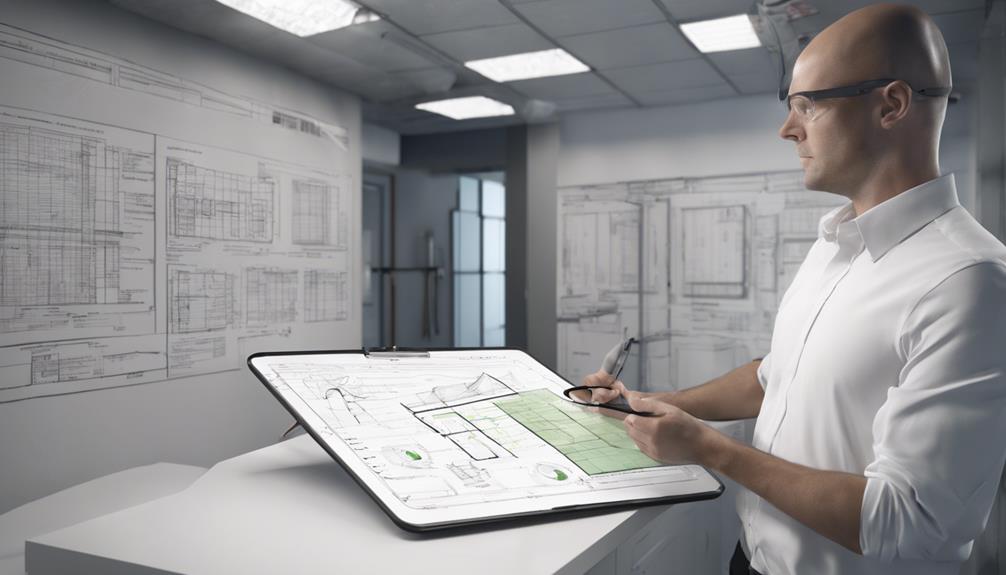Energy Auditor Job Description
Energy Auditors analyze energy usage, identify inefficiencies, and offer solutions to enhance efficiency. They inspect HVAC systems, lighting, insulation, and more. Auditors hold a degree in engineering or environmental science, along with specialized training. Skills like data analysis and knowledge of energy management software are essential. Certified auditors find employment in consulting firms, government agencies, and engineering companies. In-depth assessments help in reducing carbon footprints and promoting resource conservation. The role offers career growth opportunities and higher salary potential with experience. Learn about the qualifications, skills, and tools used by Energy Auditors for successful energy evaluations.
Key Takeaways
- Conduct detailed energy assessments for efficiency evaluation.
- Identify areas of energy wastage and recommend improvements.
- Evaluate HVAC systems, lighting, insulation, and building envelope.
- Provide energy-saving tips and sustainability practices.
- Stay updated on industry trends and certifications for expertise.
Responsibilities of an Energy Auditor
The main duties of an Energy Auditor primarily involve conducting thorough assessments of energy usage and efficiency in various types of buildings and facilities. Energy Auditors are tasked with identifying areas where energy is being wasted and providing recommendations for improving efficiency. This includes evaluating the heating, ventilation, and air conditioning (HVAC) systems, lighting fixtures, insulation, and overall building envelope. By analyzing energy consumption patterns, Energy Auditors can suggest energy-saving tips and sustainability practices to reduce costs and minimize environmental impact.
Moreover, Energy Auditors play a vital role in promoting green buildings and encouraging the use of renewable energy sources. They assess the feasibility of integrating solar panels, wind turbines, or geothermal systems into the building's energy infrastructure. By staying updated on the latest technologies and trends in sustainability, Energy Auditors help organizations shift towards more environmentally friendly practices. Overall, their work is essential in driving energy efficiency and promoting a greener, more sustainable future.
Qualifications Required for Energy Auditors
To become an energy auditor, candidates typically need a combination of education and training in fields such as engineering, environmental science, or a related discipline. Proficiency in technical knowledge related to energy systems and building performance is essential to assess energy usage effectively.
Additionally, many employers require energy auditors to obtain relevant certifications to demonstrate their expertise and credibility in the field.
Education and Training
What specific educational background and training are necessary for individuals seeking to become energy auditors?
To pursue a career as an energy auditor, individuals typically need a bachelor's degree in engineering, environmental science, or a related field. Additionally, completing specialized training programs in energy auditing, building systems, and energy conservation techniques is essential.
These training programs equip aspiring energy auditors with the necessary knowledge and skills to assess energy usage in buildings effectively. Some career options for energy auditors include working for energy consulting firms, government agencies, or engineering companies.
Technical Knowledge
Possessing a strong foundation in technical knowledge is essential for individuals aspiring to become successful energy auditors. Staying informed about industry trends and emerging technologies is vital to provide up-to-date recommendations for improving energy consumption and implementing savings strategies. Energy auditors need to be well-versed in analyzing energy usage patterns, identifying inefficiencies, and proposing effective solutions to optimize energy performance in various settings. A solid grasp of building systems, HVAC operations, lighting technologies, and renewable energy options is fundamental for conducting thorough energy audits. Additionally, familiarity with energy management software and data analysis tools is beneficial for accurately evaluating energy usage and potential savings opportunities.
| Technical Knowledge | Importance | Examples |
|---|---|---|
| Industry Trends | Stay updated | Market reports, conferences |
| Emerging Technologies | Innovation awareness | Smart meters, IoT devices |
| Energy Consumption | Understanding usage | Load profiles, peak demand |
| Savings Strategies | Implementing savings | Energy-efficient equipment, solar panels |
Certification Requirements
Acquiring the appropriate certifications is imperative for individuals looking to establish credibility and expertise as energy auditors in the field. Certification requirements for energy auditors typically include completing training programs accredited by industry standards such as the Building Performance Institute (BPI) or the Association of Energy Engineers (AEE).
These certifications validate the auditor's competency in conducting energy audits, analyzing energy usage data, identifying energy efficiency opportunities, and recommending energy-saving solutions. Additionally, some employers may require specific certifications like Certified Energy Manager (CEM) or Certified Energy Auditor (CEA) for certain job roles.
Skills Needed for Energy Auditing
Demonstrating proficiency in data analysis and building systems knowledge is essential for individuals working in the field of energy auditing. Energy auditors need a strong foundation in energy saving strategies and building performance to effectively assess and recommend improvements for energy efficiency in various structures. Here are some key skills required for energy auditors:
| Skills | Description |
|---|---|
| Data Analysis | Ability to analyze energy usage data and identify patterns and trends that can lead to energy-saving opportunities. |
| Building Systems Knowledge | Understanding of HVAC systems, lighting, insulation, and other building components to assess their impact on energy consumption. |
| Communication Skills | Clear communication with clients, team members, and stakeholders to explain energy audit findings and recommended strategies effectively. |
Energy auditors must possess a combination of technical expertise and communication skills to accurately evaluate building energy performance and propose viable energy-saving solutions.
Typical Day in the Life of an Energy Auditor
In the daily operations of an energy auditor, meticulous inspection and analysis of building energy systems play a pivotal role in identifying potential energy efficiency enhancements. A typical day for an energy auditor involves conducting thorough assessments of various energy-consuming systems within buildings, such as HVAC, lighting, and insulation. This entails utilizing specialized tools and technologies to measure energy consumption, assess equipment performance, and identify areas for improvement.
Client interactions are also a significant aspect of an energy auditor's daily routine. Engaging with clients to understand their energy usage patterns, concerns, and goals is vital for tailoring audit recommendations to meet their specific needs. Effective communication skills are essential when explaining audit findings, proposed solutions, and potential cost savings to clients in a clear and understandable manner.
Moreover, documenting audit results, preparing detailed reports, and presenting findings to clients are essential tasks that promote transparency and accountability in the auditing process. A well-rounded energy auditor must possess a combination of technical expertise, analytical skills, and interpersonal abilities to successfully navigate through a typical day in this profession.
Tools and Technologies Used by Energy Auditors
Utilizing a range of advanced tools and technologies is essential to the work of energy auditors in evaluating and optimizing building energy systems. Energy auditors employ various energy-saving technologies to assess building performance and identify areas for improvement. These professionals utilize tools such as infrared cameras to detect insulation gaps and air leaks, energy meters to measure energy consumption accurately, and blower doors to assess building airtightness.
Data analysis plays a vital role in the work of energy auditors, who leverage software applications to analyze energy usage patterns and identify inefficiencies. Building energy simulation software allows auditors to model different scenarios and evaluate the potential impact of energy-saving measures. Advanced technologies like drones are also increasingly used to conduct aerial inspections of large buildings, providing valuable data for energy audits.
To conclude, energy auditors rely on a sophisticated toolkit to conduct thorough assessments and recommend strategies for enhancing energy efficiency within buildings.
Importance of Energy Auditing in Todays World
Energy auditing plays a vital role in conducting thorough environmental impact assessments, identifying areas for energy efficiency improvements, and uncovering valuable cost-saving opportunities within various sectors.
By evaluating energy consumption patterns and recommending tailored solutions, energy auditors contribute greatly to sustainability efforts and the reduction of carbon footprints.
The practice of energy auditing is essential in today's world to promote resource conservation, mitigate climate change effects, and drive economic competitiveness through optimized energy management strategies.
Environmental Impact Assessment
Conducting a thorough environmental impact evaluation through energy auditing is essential in today's world to comprehend and mitigate the ecological consequences of energy consumption. This process helps in appraising the environmental impact of energy usage and identifying areas for enhancement in energy efficiency.
The significance of energy auditing for environmental impact evaluation can be summarized as follows:
- Identification of Energy Inefficiencies: Energy audits reveal areas where energy is being squandered, leading to a higher environmental impact.
- Promotion of Sustainability: By evaluating energy consumption patterns, energy auditing aids in advocating sustainable practices for a greener future.
- Reduction of Carbon Footprint: Understanding the environmental impact of energy consumption allows for strategic measures to diminish the carbon footprint and overall ecological harm.
Energy Efficiency Improvements
In the domain of modern energy management practices, optimizing energy efficiency through meticulous assessment and targeted improvements is imperative for sustainable operations. Energy consumption is a critical aspect to take into account when aiming for energy efficiency enhancements.
Energy auditors analyze data to identify areas of high energy consumption and suggest strategies to reduce waste. Building efficiency plays a key role in enhancing overall energy performance. Auditors evaluate building systems, such as HVAC, lighting, and insulation, to recommend upgrades that can boost efficiency.
Cost-Saving Opportunities
The assessment of cost-saving opportunities through energy auditing is essential in today's world of sustainable business practices. Energy auditors play a vital role in identifying potential areas where energy efficiency improvements can lead to significant financial benefits for organizations. Here are key aspects highlighting the importance of energy auditing:
- Energy Saving Tips: Energy auditors provide valuable insights into practical energy saving tips that can be implemented to reduce energy consumption effectively.
- Financial Benefits: By enhancing energy efficiency, businesses can lower their operational costs, leading to substantial financial benefits over time.
- Operational Costs: Energy auditing helps in identifying inefficiencies that contribute to high operational costs, allowing businesses to streamline their energy usage for improved cost-effectiveness.
Career Growth Opportunities for Energy Auditors
As energy auditors gain experience and expertise in the field of energy efficiency, various career advancement opportunities become available to them. One significant aspect of career growth for energy auditors is the potential for advancement into managerial positions. Experienced auditors may progress to roles such as Energy Efficiency Project Manager, where they oversee a team of auditors and manage large-scale energy efficiency projects for organizations. Additionally, energy auditors who demonstrate exceptional skills and knowledge in the field may have the opportunity to become Energy Consultants, providing expert advice to clients on energy-saving measures.
In terms of salary potential, career growth opportunities can also lead to increased earnings for energy auditors. Moving into higher-level positions typically comes with a salary boost, reflecting the added responsibilities and leadership roles that come with these positions. Energy auditors who advance into managerial or consulting roles often command higher salaries due to their specialized expertise and ability to drive significant energy savings for clients. Overall, the career growth opportunities for energy auditors are promising, offering both professional advancement and the potential for increased financial rewards.
Conclusion
In summary, the role of an energy auditor is essential in ensuring energy efficiency and sustainability in today's world.
By conducting thorough inspections and assessments, energy auditors play a pivotal role in identifying areas for improvement and reducing energy consumption.
With the use of advanced tools and technologies, energy auditors have the potential to make a significant impact on global energy conservation efforts.
As the demand for energy efficiency continues to grow, the career opportunities for energy auditors are also on the rise.







